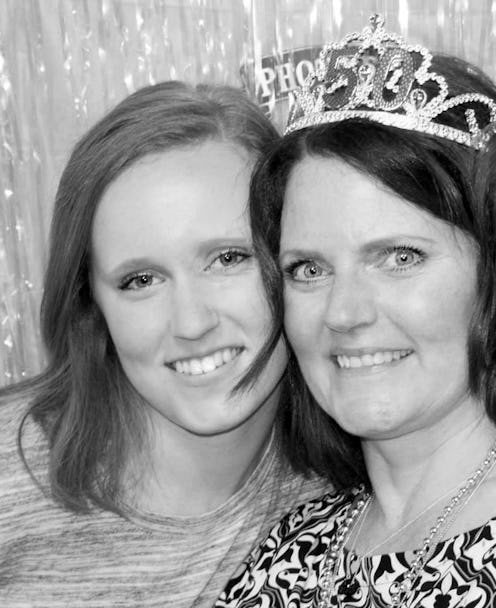Life
What My Mom's MS Has Taught Me

I administered my first drug injection when I was eight. My mom usually assigned the job — not typically intended for third graders — to either my firefighter father or my then 15-year-old big sister, Ashley. But on this occasion, my dad was away on a 24-hour shift, Ashley was at track practice, and my mom lacked the strength needed to grasp her needle. I was the last Schubert standing, and this day-to-day drill was a crucial part of the treatment for my mother’s multiple sclerosis; an unpredictable and incurable disease that attacks the central nervous system, and has plagued my mom since she was 18 years old.
Without faltering, my tiny hands picked up the syringe that housed 20-milligrams of Copaxone, and held it hovering over my mom’s left thigh, already speckled in purple, blue, and black, splotchy bruises from months of this daily routine.
“Is this the right spot?” I asked nervously.
“That’s perfect, Twinkle Toes,” my mom replied. “Don’t worry. I won’t feel a thing.”
I don’t want to call my mom’s MS a “blessing in disguise,” because that seems a bit selfish. But I would undoubtedly say that my mother’s unfortunate condition has taught both me and the rest of my family a great deal about happiness and the uncertainty of life.
March is National MS Awareness Month: a time to raise awareness of this crippling disease and support people like my mother who are forced to face MS for more than just 31 days of the year. The disease — which affects approximately 2.3 million people worldwide — often results in difficulty walking, numbness, nerve pain, and fatigue, among other problems. These symptoms range from mild to severe. My mom’s case is far on the latter end of the spectrum. Unlike many MS patients who can walk completely independently or with the aid of a cane or a walker, my mother is entirely immobile, and has relied on an electric scooter since she was 35.
A pamphlet created by the National MS Society titled “When A Parent Has MS: A Teenager’s Guide” says that kids who grow up with a mom or dad with the disease often show negative psycho-social effects such as feelings of fear, anger, and embarrassment throughout childhood and adolescence.
While I'm sure this can be the case, in my eyes, my upbringing was anything but negative. Because my mom’s disability prevented her from completing everyday chores such as cooking, vacuuming, and sweeping, I took up these responsibilities from the time I was about seven, and gained a sense of independence and diligence that many other kids my age wouldn’t experience for another decade.
Meagan Kehoe, the programs specialist for the National MS Society’s Greater Illinois Chapter, says a parent’s MS often causes children to feel isolated and misunderstood by their peers. But again, this wasn't my experience.
The way I saw it, my childhood was just like everyone else’s. I spent most of my free time reading “Magic Tree House” books, I begged my parents to let me have pizza for breakfast, and I had more Tamagotchis than anyone else in my class (11, to be exact). Sure, my mom couldn’t walk. So what?
Maybe she wasn’t able to tuck me in at night, pack my lunch, or scoop me up after my first day of school, but that doesn’t mean she loved me any less. Instead, my mom showed she cared by sitting me on her lap for a joy ride through the mall, (on “bunny speed,” as she called it), by bringing me and my sister to the front of every roller coaster line at Six Flags, and by letting me practice parallel parking with her scooter in our living room. (She told me I was an excellent driver.)
There’s a catchphrase my mom likes to use: “I can do anything you can do, just a little differently.” These words beat through my head like a drum every time I watch her push the Swiffer around the bathroom floor with her scooter wheels, or roll up the ramp of our handicap accessible van for a road trip, reminding me to look down at my two working legs and smile.
I don’t want to call my mom’s MS a “blessing in disguise,” because that seems a bit selfish. But I would undoubtedly say that my mother’s unfortunate condition has taught both me and the rest of my family a great deal about happiness and the uncertainty of life.
It’s never easy listening to my mom cry from the grueling pain she endures on a daily basis, or watching her sometimes fall to the floor when she tries to take the few steps from her scooter to her bed. It would be simple for me to shut down in these moments. But instead, watching my mom literally pick herself back up time and time again has taught me that it's possible to recover from any fall.
My own problems seem so trivial compared to what my mom goes through every day, yet these lessons follow me around to help me find a solution to any issue I face, whether it be bouncing back from a bad test score or reminding myself that a bad haircut isn't the end of the world. I don’t believe my mother would be able to consistently see the bright side if she hadn’t already seen the dark, and I can’t thank her enough for shedding a pinch of that light on me.
Images: Abbey Schubert
This article was originally published on